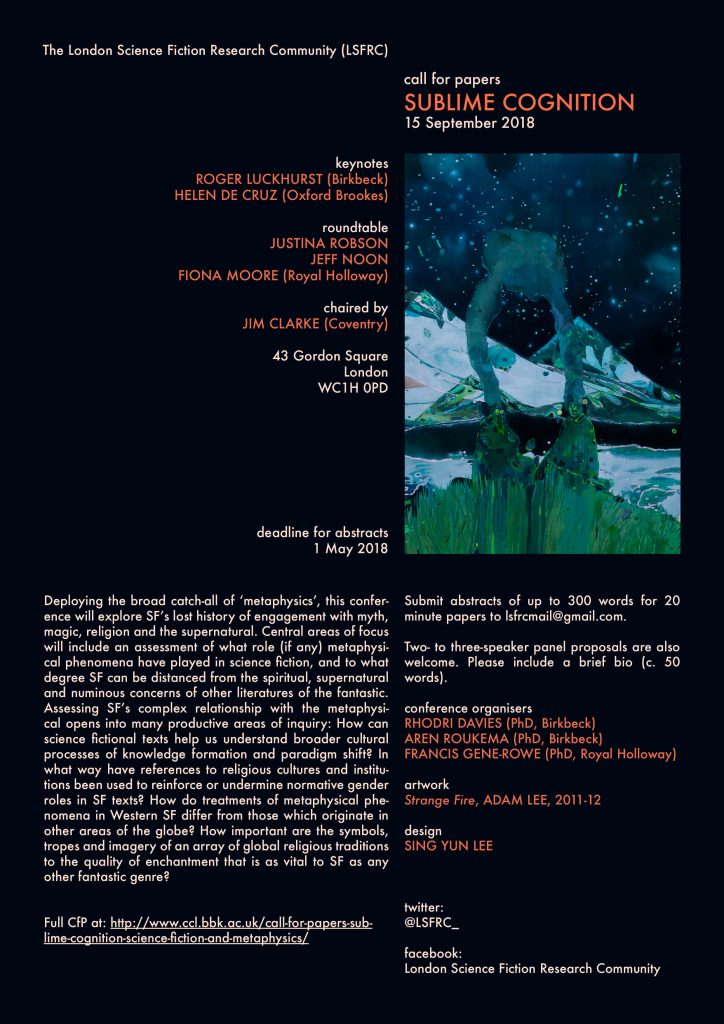Call for Papers: Are we Living in an Age of Distraction?
Graduate Student Conference
Organized by Birkbeck Institute of Humanities, Birkbeck Institute for Social Research and Birkbeck Gender and Sexuality
Birkbeck, University of London (Room, TBA)
Keynote Speakers TBA
8 & 9 June 2018
Deadline: 26 April 2018
Please send a 200 word abstract for papers of 15 minutes and a 50 word biography to bisr@bbk.ac.uk
This conference explores distraction and all its meanings and implications. Distraction is commonly thought of as a growing concern or even a sickness of modern society and digital culture. From mindless scrolling to heavy consumerism, the pursuit for entertainment and satisfaction is insatiable, leaving us vulnerable to ruling corporations. Does our lack of control transform us into a conformed mass that is susceptible to tabloid media and the rise of populism? On the other hand, distraction is not necessarily steeped in negativity. In fact, it has had a long and fascinating history. Its German equivalent, ‘Zerstreuung’, comes from the idea of dispersion. At the start of the twentieth-century, Walter Benjamin defined the term as ‘floating attention’, where experience is caused by chance rather than concentration. Does lack of focus in fact allow a sense of freedom and inspiration?
Age of Distraction is a chance for an enriching discussion between MA, PhD students and early career researchers from all disciplines.
Topics to include:
- History of distraction
- Distraction and its oppositions
- Distraction and/in Education
- Distraction and madness
- Modes of Extremism: online or in reality?
- Democracy, populism, and online social networking
- Freedom of speech v. government and/or regulatory control
- Misinformation and fake news
- Dystopia/ an Orwellian society
- Distraction and creativity
- Escapism, dream and day-dream
- Feigned ignorance or ‘Turning a blind eye’
- Emotional responses
- Procrastination, boredom and solitude
- Wandering and ‘killing time’
- Inspiration, chance and serendipity
Of course, distraction can be considered from numerous perspectives:
Arts and Humanities
Distraction as a literary theme can be found in many forms, from dystopia to escapist fiction. Reading itself has been thought to have a negative impact on cognitivity and morality, the development of the popular novel suspected as a dangerous commodity. After WW1, new cinema and photography brought a wave of anxiety about modern man’s splintered focus and new perceptions. Distraction could also be a curse and blessing to the creative process, especially in the pursuit of originality. Diderot wrote in his Encyclopédie that: ‘Distraction arises from an excellent quality of the understanding, which allows the ideas to strike against, or reawaken one another’. How does this statement apply to areas such as writing, painting or film-making? Is writer’s block and procrastination a suspended state in which ideas are waiting to ‘reawaken’ or simply a result of laziness and denial?
Social Sciences
Although social media has given a platform to previously unheard voices, it is also susceptible to manipulation, as recent scandals have made clear. In this context, to what extent can social media still be considered a progressive platform for political action? Should social media be regulated, and if so how, by whom and on what criteria? Does today’s open platform really represent shared global perspectives, or does it magnify the voice of those who already have power and influence? How does use of social media relate to dominant economic ideologies, and the ‘neoliberalisation’ of leisure time and social relations?
There is widespread concern that social media can be a major source of ‘mass distraction’ from real life conditions. Today’s technological advances raise a number of concerns: In what ways do social media influence public opinion and political participation, and do they provide channels for public deliberation? Is scepticism becoming dominant in response to the rise of the concept of ‘fake news’? Are social scientists equipped with adequate theoretical tools to make sense of the sociopolitical changes accompanying unceasingly evolving communication technologies?
Law and Criminology
Distraction is also relevant to our legal and criminal justice system. Last year, the English High Court in Monroe v Hopkins [2017] EWHC had to decide what constitutes ‘serious harm’ following a Twitter war between Jack Monroe and Katie Hopkins. Legislatures around the world are examining Facebook’s internal policies and procedures as they relate to the dissemination of extremist material, hate speech and bullying. Constitutionally protected rights to freedom of speech and expression are clashing with individual claims asking for respect for private and family life. What is becoming clear is that traditional legal frameworks regulating twentieth century media are not adapt to a twenty first century world. From this perspective, the law now needs to consider both ‘the distracted’ and ‘the distractor’. Inevitably, topics that critically engage with privacy and surveillance, control society and fundamental human rights need to be discussed.
Food and refreshments will be available.
The annual Birkbeck Graduate Conference is organised by the the Birkbeck Institute for Social Research, the Birkbeck Institute for the Humanities and Birkbeck Gender and Sexuality. The Institutes’ interns for the current academic year take the lead on organising the conference.
Meet our interns for 2017-18: Azzam Al Kassir, Harooon Forde, Devin Frank, Pauline Suwanban.
We are currently recruiting PhD students to join the Working Party to help organise the conference. If you are a current Birkbeck PhD student and are interested in gaining the experience of organising an international conference please contact us on bisr@bbk.ac.uk.
Previous conferences:
.
.
Category: Archived Call for Papers, Archived Events
.
Tags: Arts and Humanities, BIH, Birkbeck Gender and Sexuality, Birkbeck Institute for Social Research, Birkbeck Institute of Humanities, BISR, distraction



